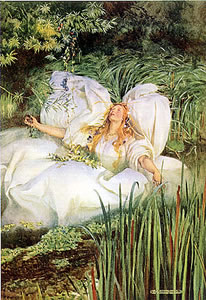![]()
Suicide = Murder
 |
The Sin of Despair:
Today, we look upon the "victims" of suicide with
compassion for the desperation that must have preceded their demise. The
Elizabethans, on the other hand, saw suicides as perpetrators, not victims.
They were guilty of the criminal offense of felonia de seipso,
or, in its shortened version felo de se -- a vile crime against
oneself. The violent nature of this particular crime, murder, was considered
all the worse because of the religious aspect of their sin. Despair was
seen as the most unforgivable of all sins and the mother of the seven
deadly sins. It was the sin that automatically excluded one from God's
grace. In addition, it was commonly held that the devil, himself, often
drove people to self-destruction. Horatio expresses this fear for Hamlet
when they see the spirit.
| What if it tempt you toward the flood, my lord, Or to the dreadful summit of the cliff That beetles o'er his base into the sea, And there assume some other horrible form, Which might deprive your sovereignty of reason And draw you into madness? Think of it. The very place puts toys of desperation, Without more motive, into every brain That looks so many fathoms to the sea And hears it roar beneath. (I.iv.69-78) |
Suicide was considered to be such a hideous form of murder that Elizabethan society dealt with it with particular harshness. The extreme reaction against it is carefully described in Michael MacDonald and Terence R. Murphy's book, Sleepless Souls.
| Suicide was a terrible crime in Tudor and early Stuart England. Self-killing was a species of murder, a felony in criminal law and a desperate sin in the eyes of the church. 'For the heinousness thereof', observed Michael Dalton, 'it is an offense against God, against the king, and against Nature.' Suicides were tried posthumously by a coroner's jury, and if they were convicted as self-murderers, they and their heirs were savagely punished. Their moveable goods, including tools, household items, money, debts owed to them, and even leases on the land that they had worked were forfeited to the crown or to the holder of a royal patent who possessed the right to such windfalls in a particular place. Self-murderers were denied Christian burials; their bodies were interred profanely, with a macabre ceremony prescribed by popular custom. The night following the inquest, officials of the parish, the churchwardens and their helpers, carried the corpse to a crossroads and threw it naked into a pit. A wooden stake was hammered through the body, pinioning it in the grave, and the hole was filled in. No prayers for the dead were repeated; the minister did not attend. - Michael MacDonald and Terence R. Murphy, Sleepless Souls, Clarendon, Oxford, 1990. p.15. |
Pleading Insanity:
There was, at least in theory, a circumstance which could soften the judgment on suicides. The finding of suicide need not bring on the harsh punishment that was customary if the suicide was found to be non compos mentis (not in their right mind). However, this exemption, which might have applied to Ophelia, while a legal possibility, was very rarely allowed in Elizabethan England. Of 803 verdicts delivered to the King's Bench in the decade before the writing of Hamlet, (1590-9) only 5 were considered non compos mentis. Thus, the verdict of felo de se was delivered in 98.5% of the cases brought to inquests. Michael MacDonald and Terence R. Murphy point out that this percentage is consistent with all the verdicts returned from 1500 to 1650. Furthermore, they state that the belief that the mentally ill were more inclined to suicide than the general public was used as proof that a death was, in fact, suicidal. If a dead person was brought to a coroner's inquest, the fact that that person was a lunatic was offered as a demonstration that the death was more likely suicidal that accidental.
| Outright madness was also considered prima-facie evidence that a suicide
had occurred. Prior to the Restoration, this often led to a felo
de se verdict when a non compos mentis finding ought to have
been recorded, as we have seen. Logically, lunatics should not have
been regarded as suicides at all. Some medical men and many laymen nevertheless
believed that the utterly insane were particularly liable to kill themselves.
- Michael MacDonald and Terence R. Murphy, Sleepless
Souls, Clarendon, Oxford, 1990. p.232. |